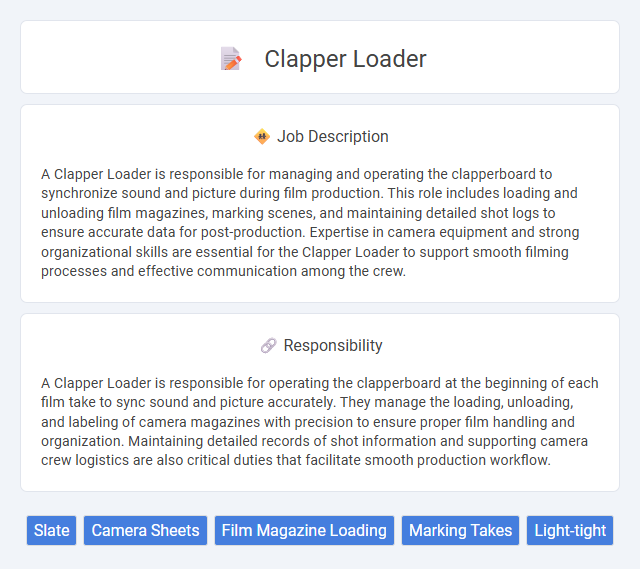
A Clapper Loader is responsible for managing and operating the clapperboard to synchronize sound and picture during film production. This role includes loading and unloading film magazines, marking scenes, and maintaining detailed shot logs to ensure accurate data for post-production. Expertise in camera equipment and strong organizational skills are essential for the Clapper Loader to support smooth filming processes and effective communication among the crew.
Individuals who are detail-oriented and able to maintain focus under high-pressure environments are likely to be well-suited for the Clapper Loader role. The job may require long hours on set and physical stamina, which could affect those prone to fatigue or discomfort in fast-paced, noisy settings. People with strong organizational skills and the ability to multitask may find a higher probability of success and satisfaction in this position.
Qualification
Successful Clapper Loaders typically possess a high school diploma or equivalent, with specialized training in film production techniques being highly advantageous. Proficiency in operating the clapperboard, understanding camera equipment, and managing film inventory are critical qualifications. Strong organizational skills, attention to detail, and the ability to work efficiently under tight schedules are essential traits for excelling in this role.
Responsibility
A Clapper Loader is responsible for operating the clapperboard at the beginning of each film take to sync sound and picture accurately. They manage the loading, unloading, and labeling of camera magazines with precision to ensure proper film handling and organization. Maintaining detailed records of shot information and supporting camera crew logistics are also critical duties that facilitate smooth production workflow.
Benefit
A Clapper Loader role likely offers significant benefits such as gaining hands-on experience with camera equipment and film handling, which can enhance technical skills and industry knowledge. Opportunities to work closely with cinematographers and crew members may increase networking potential within film production. The position might also provide a fast-paced environment that helps develop multitasking and problem-solving abilities valuable for career advancement in film and television.
Challenge
The role of a clapper loader likely involves managing the pressure of precise timing and coordination on set, making it a potentially high-stress position. Handling delicate camera equipment and ensuring accurate slate markings could present challenges that require attention to detail and quick decision-making. Navigating long hours and fast-paced shooting schedules may also increase the probability of fatigue impacting performance.
Career Advancement
Clapper loaders play a crucial role on film sets by managing camera equipment and marking film takes, which requires precise attention to detail and technical knowledge. Developing expertise in camera technology and on-set workflows can lead to promotions such as 2nd Assistant Camera or Camera Operator roles. Networking with cinematographers and investing in continuous learning opens pathways to advanced positions in the camera department and broader film production career growth.
Key Terms
Slate
A Clapper Loader is responsible for operating the slate, also known as the clapperboard, which plays a crucial role in synchronizing audio and visual elements during film production. The slate displays essential information such as the scene number, take number, director's name, and production title, ensuring precise identification and organization of footage in post-production. Accurate operation and clear marking of the slate by the Clapper Loader streamline the editing process and prevent costly reshoots.
Camera Sheets
Clapper loaders manage camera sheets, which are essential for tracking daily footage details such as scene number, take, camera settings, and film stock or media card information. These sheets ensure accurate synchronization of audio and video and help maintain organized records for post-production teams. Precise camera sheet management by the clapper loader streamlines the editing process and prevents data loss during filming.
Film Magazine Loading
Clapper loaders are responsible for loading film magazines with unexposed film stock, ensuring the film rolls remain light-tight to prevent exposure damage. They meticulously measure and spool film to maintain proper tension and alignment, essential for smooth operation during shooting. Their expertise in handling and preparing film magazines directly impacts the efficiency and quality of the film production process.
Marking Takes
A Clapper Loader meticulously marks each take by logging essential details such as scene number, take number, and shot description on the clapperboard to ensure seamless synchronization of audio and visual elements during post-production. Accurate clapperboard markings facilitate efficient editing and continuity tracking, reducing errors and speeding up the production workflow. Mastery in marking takes directly impacts the clarity and organization of footage, making the Clapper Loader vital for film and television production.
Light-tight
A Clapper Loader ensures the film magazine is securely sealed to maintain a light-tight environment, preventing exposure that can ruin footage. They meticulously check camera magazines and film canisters for any light leaks before and after loading. Maintaining a light-tight seal is crucial for preserving film integrity and ensuring high-quality image capture on set.
 kuljobs.com
kuljobs.com